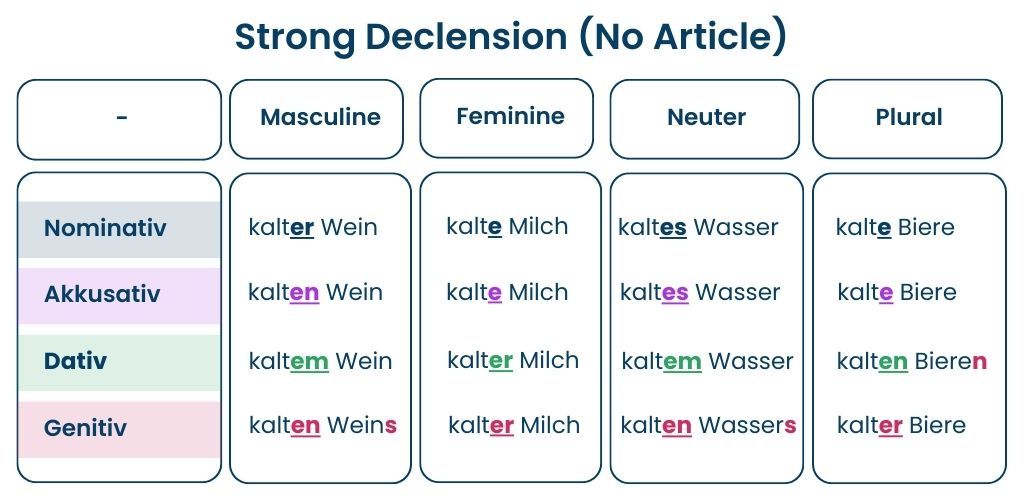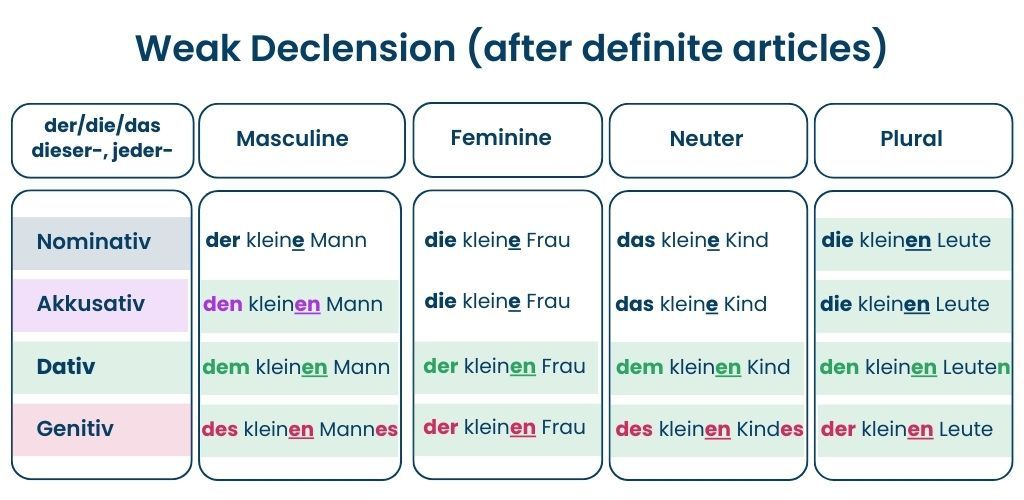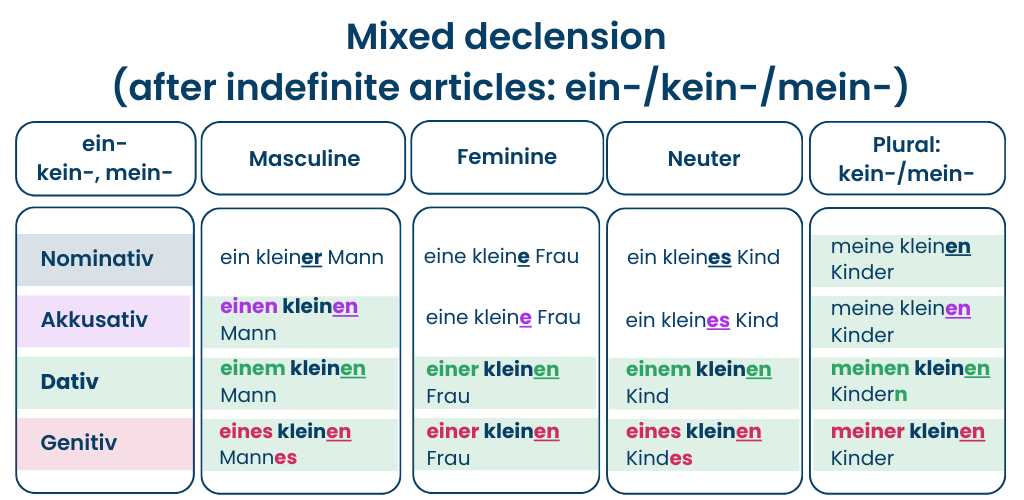CONTENT
Adjective declension means changing the adjective's ending so that it agrees with a noun in terms of gender, number, and case. We can only decline adjectives that come before a noun in German.
There are three declensions of adjectives: strong, weak, and mixed. Let's see how they differ.
Strong Declension of Adjectives
Rule 1: Sometimes, we do not use an article before a noun. An adjective "takes over" the function of the article and is declined like definite articles. We call it the strong declension.
German
English
Wir servieren kaltes Bier.
We serve cold beer.

Notes:
1) Masculine & Neuter in Genitiv: need to add -(e)s behind the noun.
2) Plural noun in Dativ form: need to add -n behind the noun.
Examples in complete sentences:
| Case | German | English |
|---|---|---|
| Nominativ | Kalter Wein ist erfrischend. | Cold wine is refreshing. |
| Accusativ | Ich trinke kalten Wein. | I drink cold wine. |
| Dativ | Mit kaltem Wein schmeckt der Käse besser. | Cheese tastes better with cold wine. |
| Genitiv | Die Farbe kalten Weins ist rot. | The color of cold wine is red. |
| Case | German | English |
|---|---|---|
| Nominativ | Kalter Wein ist erfrischend. | Cold wine is refreshing. |
| Accusativ | Ich trinke kalten Wein. | I drink cold wine. |
| Dativ | Mit kaltem Wein schmeckt der Käse besser. | Cheese tastes better with cold wine. |
| Genitiv | Die Farbe kalten Weins ist rot. | The color of cold wine is red. |
Weak Declension of Adjectives
Rule 2: We have to use the weak declension if the adjective is placed
- before a noun but after the definite article (der/die/das)
- behind words like dieser (this/these) / welcher (which) / jeder (everyone)/ mancher (some) / alle (all)
Rule 3: To decline adjectives in the weak position, we use different endings.
You should:
- put the ending -e in singular for nominative case (male, female, and neutral forms).
- also use the ending -e in singular for accusative case, but only female and neutral forms.
- use the ending -en for the rest, including plural forms.
Note: The case marker is not carried by the adjective, but rather by the particle before it.
German
English
Er liebt dieses alte Hotel.
He loves this old hotel.

Examples in complete sentences:
| Case | German | English |
|---|---|---|
| Nominativ | Der kleine Mann spielt im Park. | The small man is playing in the park. |
| Accusativ | Ich sehe den kleinen Mann im Park. | I see the small man in the park. |
| Dativ | Ich gebe dem kleinen Mann ein Buch. | I give the small man a book. |
| Genitiv | Die Tasche des kleinen Mannes ist neu. | The bag of the small man is new. |
| Case | German | English |
|---|---|---|
| Nominativ | Der kleine Mann spielt im Park. | The small man is playing in the park. |
| Accusativ | Ich sehe den kleinen Mann im Park. | I see the small man in the park. |
| Dativ | Ich gebe dem kleinen Mann ein Buch. | I give the small man a book. |
| Genitiv | Die Tasche des kleinen Mannes ist neu. | The bag of the small man is new. |
Mixed Declension of Adjectives
For Mixed Declension, the adjective ending is with either strong or weak declension.
Rule 4: We use mixed declension if the adjective is placed before a noun but after
- an indefinite article (ein)
- a possessive pronoun (mein, dein, etc.)
- a negation article (kein)
Rule 5: We use the following endings for adjectives in the mixed declension:
- For singular nominative forms: -er for male, -e for female, -es for neutral.
- For singular accusative forms: -e for female and -es for neutral.
- For the rest, including plural forms: -en.
German
English
Das ist unser schönes Haus.
This is our lovely house.

Examples in complete sentences:
| Case | German | English |
|---|---|---|
| Nominativ | Ein kleiner Mann kommt ins Zimmer. | A small man enters the room. |
| Accusativ | Ich sehe einen kleinen Mann. | I see a small man. |
| Dativ | Ich gebe einem kleinen Mann das Buch. | I give the book to a small man. |
| Genitiv | Das Spielzeug eines kleinen Kindes ist kaputt. | The toy of a small child is broken. |
| Case | German | English |
|---|---|---|
| Nominativ | Ein kleiner Mann kommt ins Zimmer. | A small man enters the room. |
| Accusativ | Ich sehe einen kleinen Mann. | I see a small man. |
| Dativ | Ich gebe einem kleinen Mann das Buch. | I give the book to a small man. |
| Genitiv | Das Spielzeug eines kleinen Kindes ist kaputt. | The toy of a small child is broken. |
